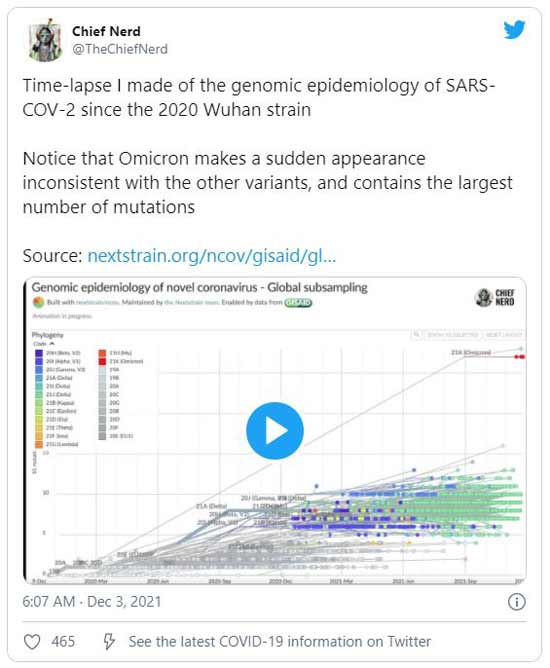According to media reports, the Omicron variant was discovered in Botswana, in four fully “vaccinated” individuals. Physicians in South Africa responded saying that while the variant has been detected, they are not seeing significant illness from it. All cases so far have been mild and none has required hospitalization
Was The New Covid Variant Manufactured?
STORY AT-A-GLANCE
- According to media reports, the Omicron variant was discovered in Botswana, in four fully “vaccinated” individuals. Physicians in South Africa responded saying that while the variant has been detected, they are not seeing significant illness from it. All cases so far have been mild and none has required hospitalization
- Omicron appears to be evading the COVID jab, resulting in breakthrough infections at a higher rate than previous variants. This is a sign that the mass vaccination campaign may be breeding “vaccine” resistance
- There’s a curious feature of Omicron, however, that hints at it having been modified in a lab. The closest genetic sequences date back to mid-2020. It doesn’t seem to belong to any of the evolutionary branches that have emerged since
- Omicron has 25 nonsynonymous and only one synonymous spike mutation compared to its most recent common ancestor, AV.1. Were it a natural occurrence, that ratio ought to be somewhere between 25 to 50 and 25 to 100
- There’s no precedent for this oddity occurring in nature. There is, however, precedent for this in lab-leaked pandemics
In Bannons War Room interview above, Dr. Robert Malone, inventor of the mRNA and DNA vaccine core platform technology,1 reviews what we know so far about the so-called Omicron variant of SARS-CoV-2.
As noted by Malone, the latest media hype actually began with reports of Africa having far lower case rates than the rest of the world, despite its comparatively low COVID jab rate. That was followed by reports in the local press that South Africa was asking Pfizer to halt its shipments of the shots, as they still had plenty and most adults were refusing to take it.
The very next day, “we suddenly had this huge kerfuffle about this new virus strain, and the press was announcing it was coming out of South Africa,” Malone says. The U.K. almost immediately responded by shutting its borders to most of South Africa.
According to media reports, the Omicron variant was discovered in Botswana, in four fully “vaccinated” individuals. Physicians in South Africa responded saying that while the variant has been detected, they are not seeing significant illness from it. All cases so far have been mild and none has required hospitalization.
Coordinated Fear Porn Campaign
In rapid succession, news articles were published proposing the virus evolved in an AIDS patient and appears to spread far easier than previous variants. Calls for concern and the need for new restrictions flooded the airways. As noted by Malone, the press was talking about “everything except for the obvious, which is that this is a ‘vaccine’-escaped mutant.”
Indeed, the variant appears highly resistant to the COVID shots, which is a sign of it having mutated within one or more COVID-jabbed individuals, not in someone with no antibodies at all to attack it.
Remember, viruses mutate primarily in response to insufficient immune responses. Yet among the first recommendations from the mental giants in charge of COVID responses was to push COVID booster shots, which is as irrational as it is unscientific.
“The boosters are a perfect way to bias our immune system so we’re LESS able to respond to this new variant,” Malone explains. “This is [like] jabbing everybody with a flu vaccine from three seasons ago and expecting it to have effects against the current [flu strains].”
Is Omicron Another Lab Creation?
As for the nature and origin of Omicron, Malone says:
“It has the hallmark of a viral agent under tight genetic selection for evolution to escape the ‘vaccine’ responses against the receptor bonding domain. The question that is outstanding right now is — because this is so different from the other strains that are being tracked; it’s in its own separate little evolutionary branch — how did this happen? Why did this suddenly pop up with all these new mutations?”
We would appreciate your donation.
The mainstream press is pushing the narrative that Omicron’s mutations are due to the low COVID jab rate in South Africa, possibly in combination with it mutating within someone with AIDS. The solution, we’re told, is to blanket Africa with COVID shots, even though the continent has enjoyed a phenomenally low case rate and mortality rate without the jabs. So, clearly, this narrative is trying to achieve an end that simply isn’t warranted by the real-world data.
Aside from shaming South Africa into getting more COVID shots, another potential reason for this narrative is that they want to hide that it’s another lab created virus. As noted by Malone, we have “the looming specter of this being further engineered in some way.”
In all, Omicron is said to have some 50 mutations from the original Alpha strain, many of which specifically allow it to circumvent COVID shot-induced antibody defenses.
While Malone admits he is not closely tracking the mutations of the virus, and is not qualified to speculate on its evolution, he points out there is a subset of experts who believe it may have undergone lab modification because, genetically, it “doesn’t look like it’s part of the prior evolutionary process that we’re seeing with many other strains.”
Until and unless we end up with conclusive proof of its origin, we need to keep all options open, Malone says, and that includes the possibility of Omicron being cooked up in a lab from a previous strain.
Omicron Cases Double in Less Than Five Days
So far, we know as little about Omicron as we did the original SARS-CoV-2 virus when it first emerged. What we do know is that it appears highly infectious, doubling in a median time of 4.8 days, and has significant “vaccine” evasion capabilities.2
According to the Economist,3 which cites data from South Africa’s National Institute for Communicable Diseases, Omicron “appears to have rapidly outcompeted Delta” in South Africa, as of the first week of December 2021 accounting for nearly all positive cases.
Omicron Is a Major Oddity

One particularly odd feature of Omicron is that the closest genetic sequences date back to mid-2020. It doesn’t seem to belong to any of the evolutionary branches that have emerged since. As noted by professor Trevor Bedford, a computational virologist interviewed by NPR, “This is very rare to see.”4
In a Twitter post, a user named Chief Nerd, shows a time-lapse graphic5 he created that illustrates the genomic epidemiology of SARS-CoV-2 from the original strain until now, using data from nextstrain.org.6
It’s a great illustration of just how odd an unnatural Omicron’s emergence really is. As the time-lapse gets toward the end of 2021, suddenly there’s Omicron, emerging like a straight line from a mid-2020 strain, having no semblance to any of the other strains.
There’s no precedent for this oddity occurring in nature. There is, however, precedent for this in lab-leaked pandemics, such as the 1977 Russian influenza, caused by an H1N1 flu strain that strongly resembled a strain in circulation between 1946 and 1957. There have been persistent rumors that the Russian flu might have been the result of a live-vaccine trial escape.7
Omicron, also known by the designation B.1.1.529., has a ratio of nonsynonymous to synonymous mutations of 25 to 1. According to molecular biologist and cancer geneticist Philip Buckhaults, Ph.D.,8 Omicron has 25 nonsynonymous and only one synonymous spike mutation compared to its most recent common ancestor, AV.1. Were it a natural occurrence, that ratio ought to be somewhere between 25 to 50 and 25 to 100.
Three Hypotheses of Omicron’s Origin
Researchers have tried to explain this phenomenon in a variety of ways. Bedford has suggested the mid-2020 strain might have infected and evolved within some unknown animal population before spilling back into the human population.
It’s an unlikely scenario though, Bedford says, because there ought then to be signs of the animal genetic material in the genome, and we’re not seeing that. Instead, there’s human RNA insertions, which suggests a human host.
Another hypothesis is so-called “cryptic spread” in an unmonitored region. In other words, the mid-2020 strain may have circulated in an area where testing and monitoring of cases were low or absent, allowing it to evolve under the radar, until finally becoming transmissible enough to spread into more monitored regions.
Alas, Bedford finds fault with this explanation as well, “Because it would seem that as [this strain of the virus] was on its path to becoming Omicron and becoming a quite transmissible virus, [the earlier versions] would have started to spread more widely before just now.”9
A third hypothesis involves the incubation in an immunocompromised patient, such as an AIDS patient. If the patient’s immune system was just robust enough to prevent death, but not complete clearance, the virus may have lingered for many months, slowly mutating over time.
The crux here is that the virus ought to have spread from that person earlier. Why did it take well over a year for it to finally be transmitted? Intermediate variants should have emerged, but didn’t. It just suddenly emerged with dozens of mutations already baked in that have no precedent.
Bedford told NPR,10 “That’s a good question and a legitimate one. I don’t have an obvious answer besides chance.” Despite the lack of plausible answers, Bedford believes this scenario may be the most plausible.
Two Elephants in the Room — The Missing Hypotheses
Of course, getting back to Malone’s observation, what’s missing from this list of hypotheses is the most obvious one, which is that the virus mutated in response to the pressure of widespread COVID injections. Also missing is the hypothesis that Omicron was genetically manipulated from a mid-2020 strain, and in one way or another entered into circulation.
Irrationally, Bedford and others are now stressing the importance on ramping up HIV treatment to prevent mutations from occurring in untreated individuals with low immune function, rather than taking a long hard look at how the mass “vaccination” campaign is driving the evolution of this virus and putting COVID jabbed individuals at ever-increasing risk of serious infection.
At present, one of the most plausible theories appears to be that scientists enabled an early SARS-CoV-2 variant to build antibody resistance, possibly by passaging them through human or humanized cell lines in the presence of convalescent plasma.
The Lab in South Africa Experimented on SARS-CoV-2
If Omicron is another lab creation, what lab might be responsible for its creation? A number of internet sleuths have pointed fingers at the biosafety level 3 (BSL3) lab in Durban, South Africa, where research on SARS-CoV-2 was taking place.
A paper titled “Escape of SARS-CoV-2 50IY.V2 from Neutralization by Convalescent Plasma”11 was published in the journal Nature at the end of March 2021. This appears to be just the kind of research that might train the virus to evade COVID antibodies.
The research, funded by the Bill & Melinda Gates Foundation, was conducted by a conglomerate of researchers, most from South Africa, but also one American and several with research credentials at both South African and German, British or American research facilities. Affiliates listed include several research facilities in South Africa, as well as research institutes in Israel, the U.K., U.S., Germany and Brazil.
In a series of December 3, 2021, Twitter posts,12 Yuri Deigin, a drug developer and biotech entrepreneur, points out that the initial emergence of Omicron was in Durban, where the BSL3 lab happens to be located, and where that study was done.
As yet, the Omicron lab leak theory is loosely held together, but if recent history is any indication, we’re bound to start seeing more extensive discussions and reviews of the evidence as we go along.
As noted in an October 10, 2021, New York Post editorial,13 the lab leak theory, referring to the original SARS-CoV-2 virus, “is now almost certainly proved” — and according to David Martin, Ph.D., proved beyond all doubt based on the patent trail, dating back two decades14 — but it took well over a year and a half to get to this point.
While the Omicron origin question is likely to grow, our fear of this variant doesn’t have to. So far, all indications are that Omicron is among the mildest of the variants — highly infectious with rapid spread, but very mild in terms of symptoms.





